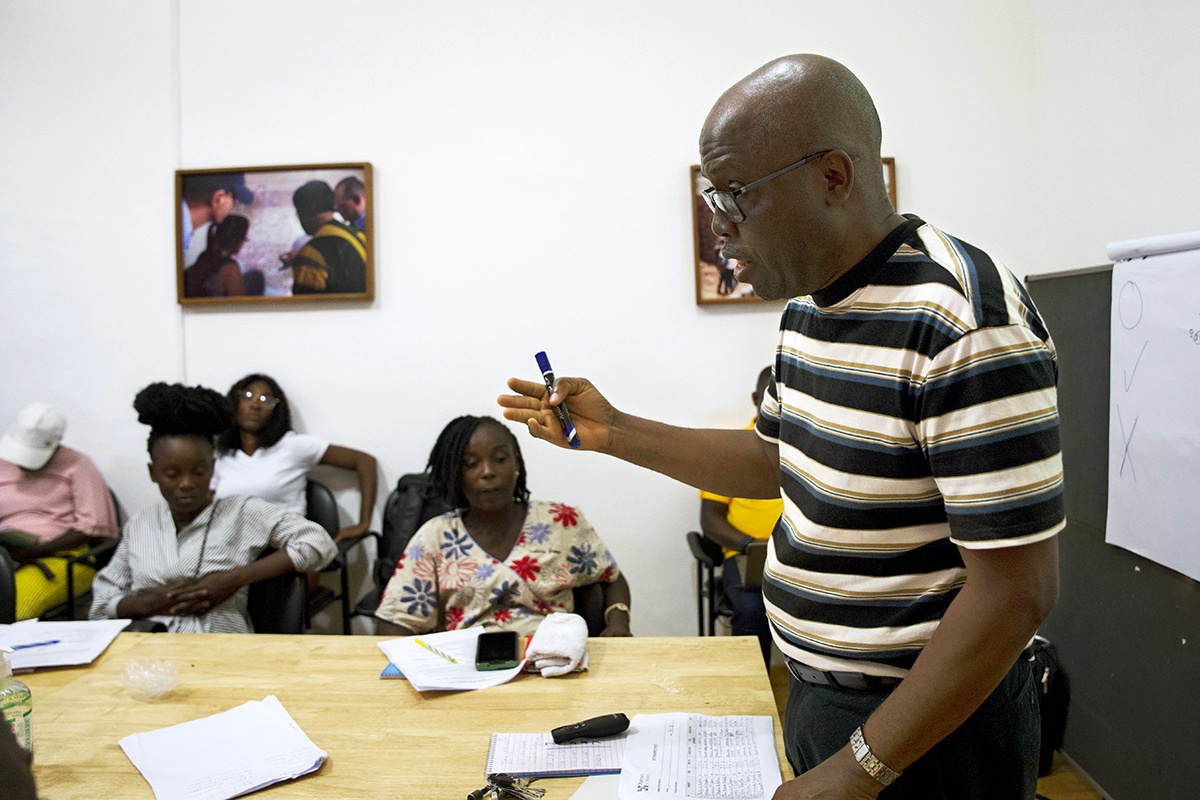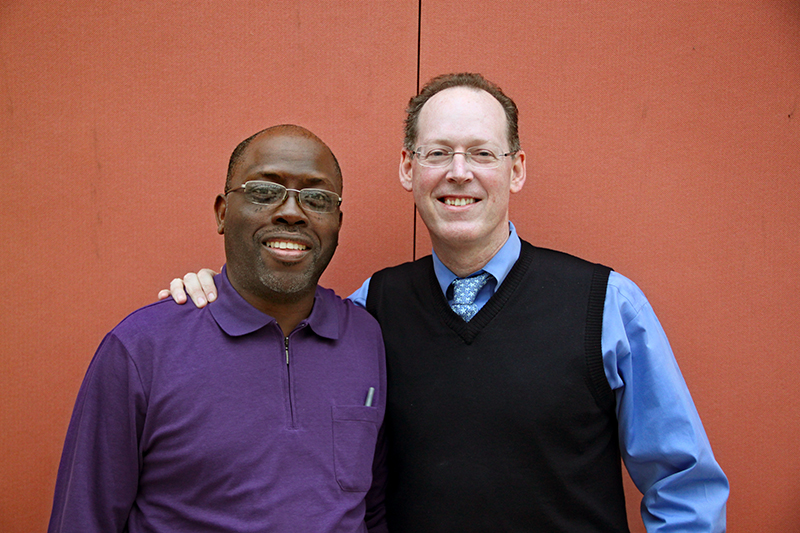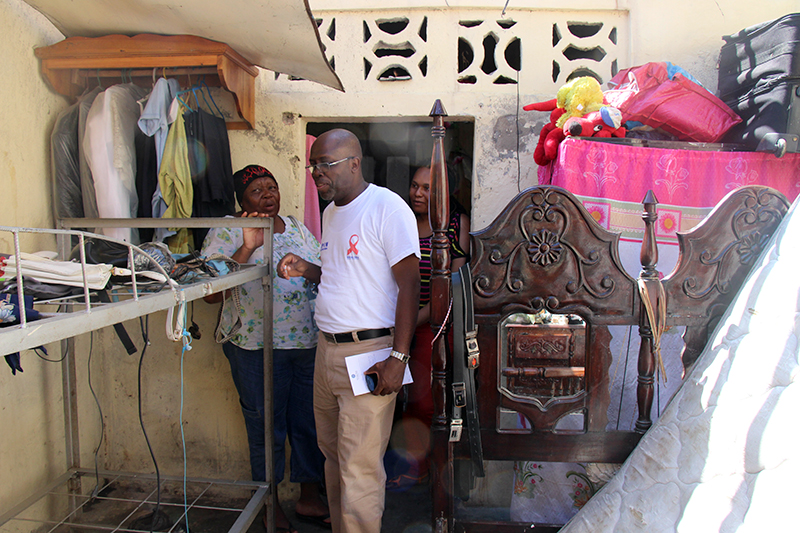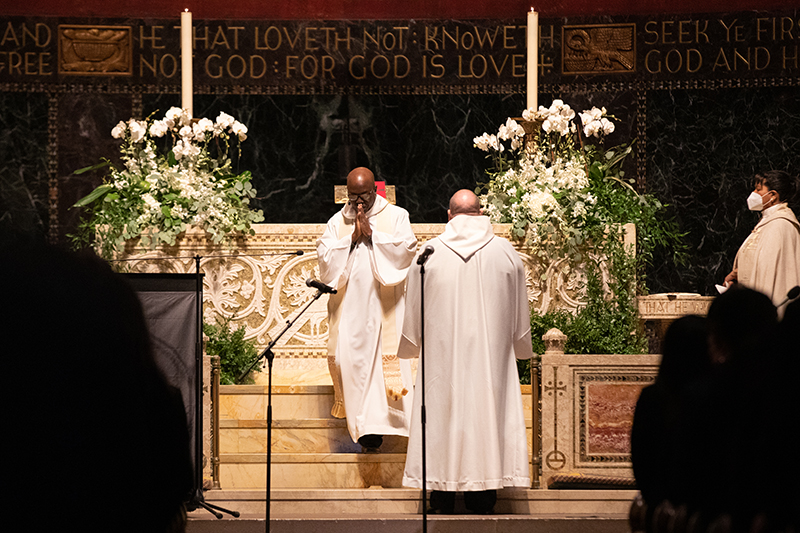Staff Wellness Program Helps Care for the Caregivers
Eddy Eustache was the first psychologist hired in Haiti. Now, he co-leads PIH’s global staff wellness program.
Posted on Jun 24, 2024

Content warning: This story mentions trauma and sexual assault
Eddy Eustache, an ordained Catholic priest and psychologist who was once dubbed Haiti’s patron saint of mental health, has been a longstanding advocate for staff wellness. Père Eddy, as he’s often called, was hired by Zanmi Lasante (ZL), as PIH is known in Haiti, in 2005 as the team’s first psychologist under the guidance of Dr. Giuseppe Raviola, PIH's co-director of global mental health. In the decades since, he’s supported hundreds of patients and staff members through personal, professional, and even national catastrophes.
His work with Zanmi Lasante initially consisted of traveling to each of its clinics to work with patients who had been diagnosed with tuberculosis and HIV and were learning to live with chronic illness. During that time, he began to see how staff were burdened by years of bearing their patients’ pain.
It takes incredible strength to confront suffering every day. According to the CDC, health workers are suffering from a mental health crisis. In 2022, nearly half of health workers reported feeling burnt out and wanting to look for a new job. Even in the early 2000s, Père Eddy saw this happening with his colleagues and is proud to now be co-leading a small global team that raises awareness about the need for staff wellness and supports interventions in favor of PIHers in need.
The Need for Staff Support
Père Eddy remembers when he first joined Zanmi Lasante, his colleagues were mostly young, healthy, and freshly graduated from medical and nursing schools. They seemed invincible. It didn’t take long for that illusion to fall as he faced his first case: a medical resident who reported being exposed to sexual assault.
“I started understanding that there was another aspect I needed to consider,” he shared. “Even though people are young, they can still be exposed to hardships.”
In 2009, Père Eddy was confronted with what would be his first of several crises that would impact his Zanmi Lasante colleagues. ZL’s director of surgery, Dr. Josue Augustin, had been murdered.
“The whole system was in shock,” he remembered. “We realized that we needed to pay more attention to the needs of the staff. They could easily and quickly become vulnerable.”
With the support of Raviola, Co-Founder Ophelia Dhal, and Chief Medical Officer Dr. Joia Mukherjee, Père Eddy began traveling to all Zanmi Lasante’s sites to conduct group debriefings, allowing the staff to express their grief collectively and find comfort and relief with one another.

Soon after he felt that the staff were starting to come back to themselves, another tragedy struck. On January 12, 2010, a massive earthquake struck Haiti. Père Eddy still remembers one of the staff members who was killed, as well as the families, friends, fiancés, and neighbors that he and his colleagues lost on that day.
“We were all impacted by it,” he said. “And at the same time, we were among the first health institutions to be standing by the Haitian people, working. People were under stress, and we needed to help them grieve. We organized a memorial ceremony at each site to allow people to release the pain, the suffering, the sorrow they had inside in order to continue work.”
The need for a support system for staff became apparent after these experiences, and the idea of a larger staff wellness program was born. Père Eddy and leaders across PIH began to understand that staff were still struggling months, and even years, after these catastrophes occurred and needed support.
A New Approach to Staff Wellness
Père Eddy very quickly became the go-to guy for psychological support. He was constantly on-call and served as a sort of dispatch for his team—redirecting calls to other mental health clinicians who could support those reaching out. He believed that helping staff would make them better caregivers for Zanmi Lasante’s patients.
“It is a great source of pain for me if I see the staff suffering,” Père Eddy said. “I used to work directly with the patients, but now, my way to work with the patients is to support the staff. If the staff is not supported, that means the patient will suffer.”
In mid-2022, Père Eddy traveled to Boston to work on the implementation of a global staff wellness program with various PIH leaders. He realized that issues staff were facing in Malawi, Peru, and Sierra Leone may be similar to those faced in Navajo Nation, Mexico, and Lesotho. He wanted to approach wellness as something that connected everyone, gathering expertise and compiling resources that could be shared with PIH colleagues globally.
“Some people like to pretend that staff wellness is only recreational,” Père Eddy said. “It is not. We need to understand how stress is having a huge toll on staff psyche.”

He says that the current success of the staff wellness program is dependent on support from executive leadership at PIH sites. Without the staff and resources needed to execute the program successfully, the program can feel inauthentic to staff members and will be ineffective.
“In places where the executive leadership is strong and supportive, the staff wellness program is flourishing,” Père Eddy said. “PIH leaders have realized that staff wellness is a basic need. The world has become more and more unsafe and the staff is exposed to all kinds of stress in addition to their personal issues. If we want them to be performing at work, we need to cultivate an ambiance of wellness.”
A Breaking Point in Haiti
If you ask Père Eddy, he will tell you that the word resiliency is not his favorite. It varies from person to person, but is ultimately a construct—like rubber bands with different elasticities that are being pulled and stretched to their limits, but, ultimately, will snap.
He believes the current crisis in Haiti may be the breaking point for Zanmi Lasante’s theoretical rubber band. As staff continue to be exposed to traumatic situations over the long term, it is eroding their ability to cope.
“When I returned to HUM last year, the work was intense,” Pére Eddy said, referring to ZL’s largest facility in Haiti, Hôpital Universitaire de Mirebalais. “Some people were exposed to direct violence, some had witnessed violence, kidnappings... and people were stressed out because of the harm that was ongoing.”
Père Eddy hadn’t been back in Haiti for long when the tensions started to rise in the streets around HUM. There were rumors going around that the gangs were going to be coming back to Mirebalais and everyone was starting to get nervous, bracing for an attack.
In the middle of the night on September 26, 2023, gang members opened fire in HUM. While there were bullet holes left in the doors and walls of the hospital’s NICU, fortunately, no staff or patients were injured. They were, however, traumatized.
“Around 3 a.m., I was reaching out to people. It was early in the morning, people were fleeing, and the staff was totally spread out,” Père Eddy remembered. “Patients were fleeing with IV fluid in their arms. It was total chaos.”
Père Eddy began working with staff and patients, both those who remained at the hospital and over the phone with those who fled. It was a long and difficult week and many of his Zanmi Lasante colleagues were reluctant to come back.
Père Eddy and a few clinicians put together small group therapy sessions for any staff who wanted to participate. He was able to see immediately how traumatized they were—some experiencing flashbacks, some still avoiding their memories. Even with armed security now surrounding the building, the staff weren’t reassured.
“We started working with them and after about a month, you could see activities starting to resume,” Père Eddy said. “Life was slowly coming back to HUM. Staff were more confident in themselves and were able to start working.”
Despite the renewed calm at HUM, staff in Port-au-Prince were still being exposed to widespread violence every day. For Père Eddy and Zanmi Lasante’s mental health team, it seemed the work could never be completed. Whether it was a staff member who was in close range to a shooting, or a resident who was kidnapped on his way to work, there was no shortage of mental health support that was needed from his small, but mighty, team.
“Violence in the streets is a concern for the whole country. People are stressed out, they are leaving,” Père Eddy explained. “Staff say, ‘I’m working with my casket under my armpit’—that they may be killed at any time. They are so uncertain about life.”
With the precariousness of each day, he says people have started “viewing their life expectancy as 24 hours.” The compounding national crisis has created a mental health crisis among Zanmi Lasante staff and patients alike.
To address the growing mental health needs of people in Haiti, Zanmi Lasante has hired three new psychologists. These clinicians will support the existing mental health team originally trained by Père Eddy.
Caring for the Caregiver
It’s no secret that Père Eddy cares an awful lot about his colleagues and the patients they serve. In his position, it would be easy to be crushed under the pressure of supporting so many people. But he said he leaves heavy conversations feeling almost weightless.
“I don’t know where I get it, but whatever suffering I’m exposed to, sometimes I may vibrate with the suffering in the moment, and once I leave the place where I was sitting and talking with this person, it was like I left all the issues that were addressed in that room,” Père Eddy shared. “This, to me, has been a gift and I’m very grateful for it.”

He also practices healthy habits that have helped him cope with long, stressful days. He relies heavily on his spirituality. He often finds relief in exercise, taking four-to-five-mile walks and practicing yoga regularly. And he believes deeply in practicing kindness, having respect for everyone, and finding support in his global PIH community.
“I don’t see myself ever turning my back on PIH, even if I retire,” Père Eddy said. “PIH is my family, and you don’t stop belonging to a family. When I see the support, when I see the staff is recovering, when they regain hope and they can rebuild confidence in themselves, this keeps me alive and motivated.”

